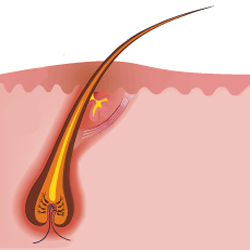Rosemary Oil and Hair
Research shows that rosemary oil may benefit well-being by relieving pain, relieving stress, improving your mood, fighting baldness, and acting as an anti-inflammatory. Studies have proven that rosemary oil can do much to boost free-radical- scavenging activities, as well as reducing the levels of cortisol, all of which can protect the human body against severe diseases caused by oxidative stress. The oils extracted from rosemary helps to boost antioxidant activities that show up as strong tools to combat diseases and infections.
Rosemary oil helps promote hair growth and hair thickness because it feeds the follicles. Combine several drops of rosemary oil, one tablespoon of castor oil, and two tablespoons of coconut oil. Rosemary essential oil does more than help boost hair growth, it can be used to treat Alopecia Areata and Androgenetic Alopecia (hair loss associated with female-pattern or male-pattern baldness). Diluted and used topically, rosemary essential oil is known for stimulating hair growth, relieving pain, soothing inflammation, eliminating headaches, strengthening the immune system, and conditioning your hair so that it looks and feels healthier.
Used in aromatherapy, Rosemary oil helps to lower stress levels and nervous tension, enhance mental activity, promote clarity and intuition, alleviate fatigue, and support respiratory function. Often used to alleviate mental fatigue and stress in folk medicine, diffusing Rosemary Essential Oil may help to boost your mood. Aromatherapy with rosemary may help decrease muscle strain, ease mental fatigue and stomach tension, and improve memory and energy levels.
One study suggests that rosemary, combined with other pleasant-smelling oils, can reduce cortisol levels and help lower anxiety. One study found that sniffing rosemary oil prior to tests helped lower stress levels during testing as well as the general levels of anxiety among nursing students (22). Another study found that using lavender and rosemary essential oils in pillowcases reduced stress during test-taking among graduate nursing students.
One study showed that a group of people who smoked rosemary essential oil (Rosmarinus officinalis) for several weeks noticed improved cognitive function and significantly increased mental alertness. The results showed that the inhalation of Rosemary essential oil reduced stress levels through decreased serum corticosterone levels and increased in-vivo dopamine levels in the brain. Scientific studies have demonstrated rosemary oils abilities to aid many common and chronic health problems,
including hair loss, liver function, high corticosterone levels, stress, cognition, and memory problems such as Alzheimer’s disease and dementia.
While its essential oils are not used in skin care as much as they are used for hair care, rosemary oil has powerful
antimicrobial and antiseptic qualities that may help you manage eczema, dermatitis, oily skin, and acne. When used in a form of massage oil, rosemary oil helps to alleviate cramps, pain, cramps, rheumatism, arthritis, and strained necks.
Rosemary is a rich source of antioxidants and anti-inflammatory compounds thought to help strengthen the immune system and enhance blood circulation.
